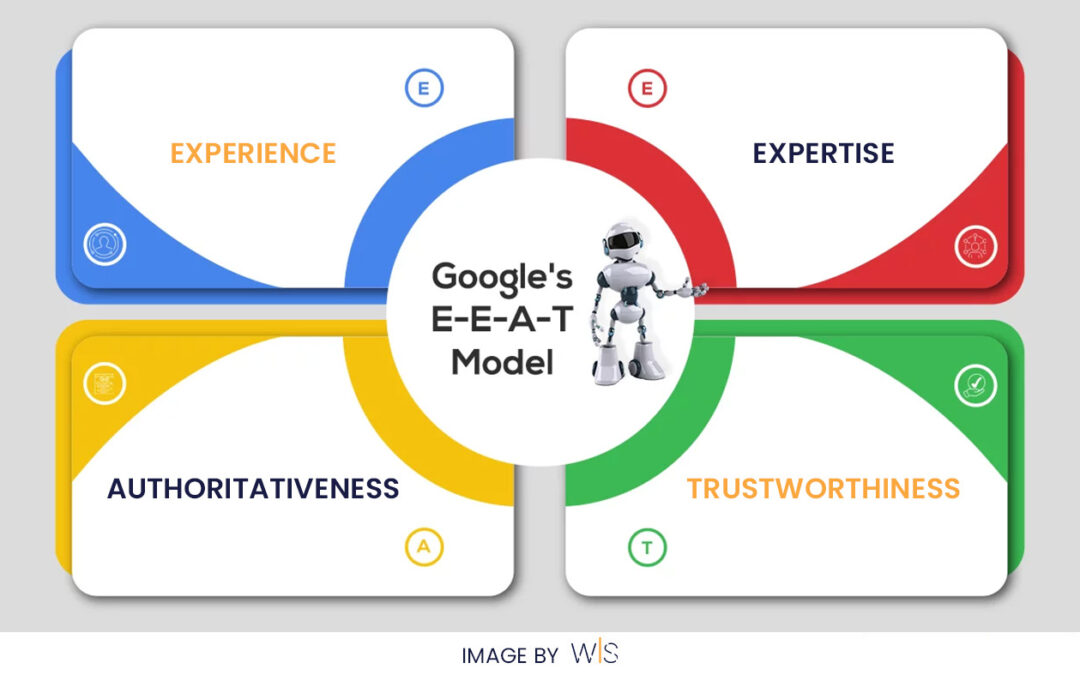Understanding EEAT in SEO: Expertise, Experience, Authoritativeness, Trustworthiness

In the world of SEO, numerous factors influence how well a website ranks in search results. One important concept is E-A-T, which was recently changed to E-E-A-T by adding another “E.” Let’s look at what this acronym stands for and why it’s important for your SEO strategy.
EAT (before December 2022):
This was the original concept, focusing on three major aspects:
-
Expertise:
Does the content show a high level of knowledge and understanding of the subject?
-
Authoritativeness:
Is the website recognised as a reliable source of information in its field?
-
Trustworthiness:
Can users be confident that the information presented is accurate and reliable?
EEAT (December 2022 – Present):
Google added an additional “E” for Experience. This emphasises the importance of content created by someone with firsthand knowledge and practical experience related to the topic.
Google’s History of Core Updates
This March 2024 update isn’t an isolated event. It’s part of Google’s ongoing commitment to search quality. Here’s a quick peek at some notable past updates:
Why E-A-T Became E-E-A-T:
The addition of “Experience” demonstrates Google’s growing emphasis on content based on real-world knowledge. While academic expertise is still important, personal experience can be equally beneficial. For example, a travel blogger who has visited a destination can provide a more insightful perspective than someone who relies solely on online research.
Understanding the E-E-A-T Framework
E-E-A-T stands for:
-
Experience:
Google now takes into account the content creator’s or website owner’s personal experience related to the topic. This highlights the importance of real-world knowledge and insights.
-
Expertise:
Content should show a deep understanding of the subject matter. Authors and publishers should be recognised authorities in their fields.
-
Authoritativeness:
The website should be considered a credible source of information. This can be accomplished through backlinks from other credible websites, awards, and industry recognition.
-
Trustworthiness:
Google prioritises trustworthiness when providing web content to users. Building trust entails things like having a secure website, providing transparent ownership information, and avoiding misleading or false content. Google values trust within E-E-A.T.
Building a Sustainable SEO Strategy
Remember that E-E-A-T is a framework, not a strict checklist. While focusing on these factors is critical, SEO is a continuous process. Here are some more strategies for long-term success:
Stay updated:
Keep up with the most recent SEO trends and Google algorithm updates.
Focus on the User Experience (UX):
Make a user-friendly website with easy navigation, quick loading times, and high-quality visuals.
Mobile optimisation:
Make sure your website is mobile-friendly, as a large portion of searches are now conducted on smartphones.
Content Consistency:
Maintain a consistent publishing schedule to keep your audience interested and Google crawlers active on your website.
Why E-E-A-T Matters for SEO
E-E-A-T isn’t a direct ranking factor, but it does play an important role in Google’s Search Quality Rating Guidelines. These guidelines assist human evaluators in determining the quality and reliability of search results.
Focusing on E-E-A-T allows you to create high-quality content that Google’s algorithm is more likely to prefer. This can result in higher rankings, more organic traffic, and, ultimately, improved website performance.
How to Improve Your Website’s E-E-A-T
Here are some tips to ensure that your website displays strong E-E-A-T:
-
Create detailed, informative content:
Focus on providing valuable insights and comprehensively answering user search queries.
-
Showcase author credentials:
If your content has an author, emphasise their experience and knowledge in the field.
-
Build backlinks from high-authority websites:
Earning backlinks from trustworthy sources signals your website’s credibility.
-
Maintain a secure and well-maintained website:
Demonstrate professionalism and user safety through technical aspects like SSL certificates and a clean design.
E-E-A-T and AI Generated Content:
The addition of the new “E” in E-E-A-T, emphasising “experience,” poses challenges for AI-generated content to meet certain quality standards. Google is currently internally discussing this issue and has yet to establish a definitive policy.
According to available information, Google advises against the direct publication of AI-generated content, such as that created with tools like ChatGPT, without prior review by a human editor. Google has also issued guidance on AI-generated content, stating that the appropriate use of AI or automation is not in violation of their guidelines.
Danny Sullivan from Google has clarified that “AI-generated content may not necessarily contravene the company’s guidelines, provided it undergoes editorial review and fact-checking processes before publication.”
By applying these techniques, you can reinforce your website’s E-E-A-T coupled with developing on your own as a trustworthy resource of info in your specific niche. This will certainly not just enhance your Search Engine Optimization yet likewise develop rely on your target market.

